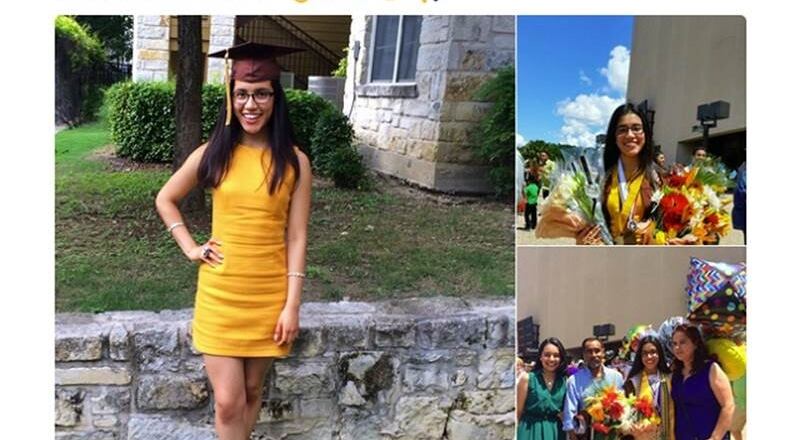A Texas high school valedictorian sparked an uproar on social media after she posted a photo of herself saying she is a high school valedictorian, has a 4.5 grade point average, “full tuition paid for at UT” and is an undocumented immigrant.
Mayte Lara posted the photo of herself in graduation garb last Friday, and it didn’t take long for people to begin questioning how she gained admittance – plus earned a scholarship – to the University of Texas.
Screenshots of the tweet that read "Valedictorian, 4.5 GPA, full tuition paid for at UT, 13 cords/medals, nice legs, oh and I'm undocumented," were shared on social media as people began criticizing the girl. Undocumented means someone who is a foreign-born person who doesn't have a legal right to be or remain in the United States.
Lara is Austin, Texas' Crockett High School valedictorian. In an interview with the Austin-American Statesman, Lara said, that in hindsight, she should have chosen her words more carefully.
“The reason I posted that tweet was to show others that you can accomplish anything, regardless of the obstacles you have in front of you,” she said. “It was a common trend on twitter to highlight your success through a tweet like that, and I saw many other students from across the country doing the same and sharing the things they’d overcome, so I thought I’d share mine.”
She said she felt her tweet was misunderstood and that she did not mean to “mock anyone.”
There are an estimated 65,000 undocumented students who graduate from U.S. high schools each year. They are guaranteed an education in U.S. public schools through grade 12. Trying to attend a college as an undocumented immigrant is another story.
Here’s a look at the law says about undocumented students.
Can undocumented students attend college in the United States?
Yes they can. There is no federal or state law that prohibits undocumented immigrants from attending college in the United States. Students applying for admission are not required to prove their citizenship under state or federal law. Most institutions set their own admission policies.
Colleges and universities in some states – Alabama, Georgia, South Carolina, Virginia and Arizona – set restrictions on undocumented students. Those restrictions, however, are not placed on them by state or federal law.
If undocumented immigrants are able to get into state colleges and universities, can they pay the lower tuition rates that state residents pay?
Seventeen states currently have laws permitting certain undocumented students who have attended and graduated from their primary and secondary schools to pay in-state tuition rates.
Those states are California, Colorado, Connecticut, Florida, Illinois, Kansas, Maryland, Minnesota, Nebraska, New Jersey, New Mexico, New York, Oklahoma, Oregon, Texas, Utah, and Washington.
Rhode Island considers in-state tuition rates for undocumented students on a case-by-case basis.
Five of the states that allow undocumented students to pay in-state tuition also allow the students to apply for state financial aid — California, Minnesota, New Mexico, Texas and Washington.
Can undocumented students get financial aid in other states?
Undocumented students cannot legally receive any federally-funded student financial aid, including loans, grants, scholarships or work-study money. With the exceptions above, in most states they are not eligible for state financial aid. Private scholarship funds and foundations generally require applicants to be U.S. citizens or legal residents.
However, as with admissions, it's up to the colleges and universities whether they will allow undocumented students to apply for aid.
Which colleges are considered “un-doc” friendly when it comes to financial aid?
There are several U.S. colleges and universities that offer undocumented students financial aid. Many classify undocumented students the same way foreign students are classified.
Some of the colleges that fall into that category are: Duke, Amherst, Brown, Emory, Harvard, Princeton, Oberlin College and Rice. There are several others.
What about the case in Texas?
According to a story from the Austin-American Statesman, Lara has Deferred Action for Childhood Arrivals, or DACA, status. What that means is that certain young people who came to the United States as children receive a renewable two-year work permit and an exemption from deportation. The U.S. government has granted DACA status to more than half a million people.
As for the scholarship to the University of Texas, UT spokesman Gary Susswein explained, “In accordance with state law, Texas universities — including the University of Texas schools — have for decades granted two-semester tuition waivers to valedictorians of Texas public high schools, without regard to their residency status. State law also does not distinguish between documented and undocumented graduates of Texas high schools in admissions and financial aid decisions. University policies reflect that law."
About the Author
The Latest
Featured


